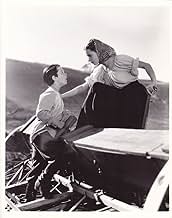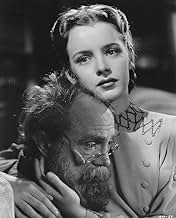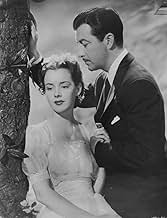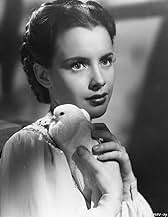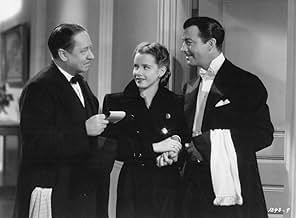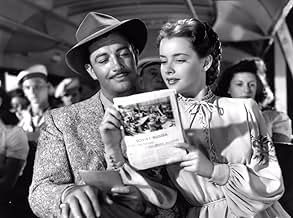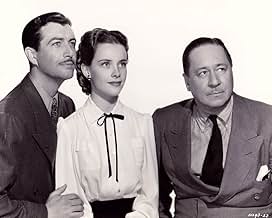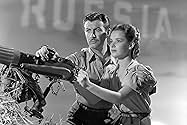Propaganda film from WW2, designed to raise the awareness of the American public regarding USSR's fight against Nazi Germany.Propaganda film from WW2, designed to raise the awareness of the American public regarding USSR's fight against Nazi Germany.Propaganda film from WW2, designed to raise the awareness of the American public regarding USSR's fight against Nazi Germany.
- Awards
- 2 wins total
Konstantin Shayne
- Wounded Soldier
- (as Konstantine Shayne)
John Wengraf
- Red Army Commander
- (as John E. Wengraf)
Featured reviews
Thanks to TCM for airing this astounding propaganda film in October 2003. Others have commented on the nearly unbearable Soviet propaganda in the film, but I watched the Stalin-supplied footage with awe as I had never seen most of it before, at least in this quality and quantity.
The story is stock melodrama with the morals that we (America) must support our Russian allies at all costs and that the scorched earth policy is major war strategy.
But through it all is the luminous face of Susan Peters, who was tragically paralyzed two years after this film's release and died in 1952. She is charming, delightful and disarming enough to inspire a whole village as well as the American conductor (Robert Taylor) who falls in love with her. They marry in an unlikely semi-religious ceremony.
The notions that 1.)An American would be invited on a 40-city tour of Russia in early 1941, and 2.)That he would be able to take his Russian bride out of the Soviet Union (after the German invasion!) "for the greater good of Mother Russia," are pure fantasy. The huge symphony orchestras and the vast, aristocratic, jewel-bedecked audiences we see at theatre after theatre are laughably anti-communist, and the men would most likely have been conscripted by that time.
Yet, as films reflect the history of our lives, I found this a fascinating chapter of the very brief period of US/USSR alliance. I'd love to see it again.
The story is stock melodrama with the morals that we (America) must support our Russian allies at all costs and that the scorched earth policy is major war strategy.
But through it all is the luminous face of Susan Peters, who was tragically paralyzed two years after this film's release and died in 1952. She is charming, delightful and disarming enough to inspire a whole village as well as the American conductor (Robert Taylor) who falls in love with her. They marry in an unlikely semi-religious ceremony.
The notions that 1.)An American would be invited on a 40-city tour of Russia in early 1941, and 2.)That he would be able to take his Russian bride out of the Soviet Union (after the German invasion!) "for the greater good of Mother Russia," are pure fantasy. The huge symphony orchestras and the vast, aristocratic, jewel-bedecked audiences we see at theatre after theatre are laughably anti-communist, and the men would most likely have been conscripted by that time.
Yet, as films reflect the history of our lives, I found this a fascinating chapter of the very brief period of US/USSR alliance. I'd love to see it again.
Look: This film IS propaganda, but it certainly isn't Soviet propaganda. I think it is clear from watching the film disinterestedly and/or reading ALL of the transcripts of Ayn Rand's HUAC testimony that it was American wartime propaganda aiming at 1) strengthening political ties with its then-ally Soviets, and 2) convincing the American's that they should support the joint effort with the Russians against Germany. The US was too afraid to admit to the American people that they, like, Churchill said, had to work with the devil to defeat Hitler; they used propaganda film instead (ad not just here, but overtly as part of Frank Capra's "Why We Fight" series). Further, I think it is probable, as a previous poster mentioned, that they are only guilty of writing a very ill-conceived "love knows no bounds" kind of war time love story; this is just a year or so after Casablanca, after all! The movie certainly was picked up, partly on the basis of the love-knows-no-bounds angle, but more overtly b/c, as the awful Robert Taylor pointed out in his own HUAC testimony, the request came from the US State department.
Like a previous writer, I too saw this movie as a child during World War 11.
I really cannot comment on its artistic value so many years later, however, as a young person ( with my Father overseas)during that point in history, it was something to see to bring closer the effects and personality of war. The one poignant thing about the movie that I still remember clearly was the playing of Tchaikovsky's very famous Piano Concerto #1 in B-Flat. It was my first real introduction to classical music. If nothing else, I am thankful for the film bringing this to me, for it and classical music have played an enormous part in my life ever since! It led me to study music and have been professionally involved in music all my working life. My thanks go to "Song Of Russia" and Tchaikovsky -Doug-
I really cannot comment on its artistic value so many years later, however, as a young person ( with my Father overseas)during that point in history, it was something to see to bring closer the effects and personality of war. The one poignant thing about the movie that I still remember clearly was the playing of Tchaikovsky's very famous Piano Concerto #1 in B-Flat. It was my first real introduction to classical music. If nothing else, I am thankful for the film bringing this to me, for it and classical music have played an enormous part in my life ever since! It led me to study music and have been professionally involved in music all my working life. My thanks go to "Song Of Russia" and Tchaikovsky -Doug-
I'll be the first to admit that this film was a bald effort at propaganda. I'll also admit that the conditions depicted in Russia were far from reality. However, this isn't the first effort at propaganda by Hollywood, nor is it the first (or the thousandth) that takes a wide berth from reality.
If you look at the movie's setting (happy Russians with a benevolent leader) as fantasy, and imagine the Russia shown in the movie as a mythical nation, then you have a dandy story here. Propaganda aside, the storyline here is excellent; it's engrossing, well-written and intelligent. The acting is superb, from top stars Taylor and Peters down to the bit players and extras. The dance scenes are well choreographed.
The music, mostly that of Tchaikovsky, is superb, and the soundtrack is masterfully woven into the background throughout the story. The music is well-played and well conducted by Albert Coates (who also did the piano work). As for the piano, Susan Peters does a good job of finger placement that could fool all but the trained eye into thinking that she could actually play the piano (she couldn't at the level shown in the movie). The one fault herein is Taylor's attempts to imitate a conductor: suffice it to say that it's out of sync and overstated to the point of absurdity.
As a side note, many of the members of the Peter Meremblum orchestra (prodigal young musicians, many of whom went on to careers in music, and a few of whom became very well-known in the world of music) appear throughout the movie, mainly as extras and as kids in the village and youths in the Moscow Conservatory. The orchestra also performed some of the background music.
All in all, this is an excellent movie if one can overlook the propaganda and anti-realism and treat it as a fantasy/fiction.
If you look at the movie's setting (happy Russians with a benevolent leader) as fantasy, and imagine the Russia shown in the movie as a mythical nation, then you have a dandy story here. Propaganda aside, the storyline here is excellent; it's engrossing, well-written and intelligent. The acting is superb, from top stars Taylor and Peters down to the bit players and extras. The dance scenes are well choreographed.
The music, mostly that of Tchaikovsky, is superb, and the soundtrack is masterfully woven into the background throughout the story. The music is well-played and well conducted by Albert Coates (who also did the piano work). As for the piano, Susan Peters does a good job of finger placement that could fool all but the trained eye into thinking that she could actually play the piano (she couldn't at the level shown in the movie). The one fault herein is Taylor's attempts to imitate a conductor: suffice it to say that it's out of sync and overstated to the point of absurdity.
As a side note, many of the members of the Peter Meremblum orchestra (prodigal young musicians, many of whom went on to careers in music, and a few of whom became very well-known in the world of music) appear throughout the movie, mainly as extras and as kids in the village and youths in the Moscow Conservatory. The orchestra also performed some of the background music.
All in all, this is an excellent movie if one can overlook the propaganda and anti-realism and treat it as a fantasy/fiction.
"Song of Russia" is far from a great film, but it is really fascinating to look at nowadays, both as a historical time capsule and as an excellent specimen of MGM camp. The film was designed to drum up sympathy for our then-allies, the Soviet Union, and is sheer, unabashed propaganda. It is well-enough made, but, meaning no disrespect to the millions of Russians who suffered and died during the war, it is so cornball and manipulative seen now that its difficult to take seriously. In fact, its most famous now for the after-effects of its release at the end of the 40's in the HUAC meetings where Robert Taylor testified and "named names" and where it caused all sorts of problems for its makers. Robert Taylor rises to his usual heights of bland adequacy here, but Susan Peters, a tragic actress if ever there was one, does quite well as his Russian bride.
Some of the more hilarious scenes include a wedding dance where the entire village takes part and come across more like a Broadway troupe with decades of experience and the depiction of the "typical" Russian village,which looks like a Slavic version of Andy Hardy's small town. Miss Peters character is also quite the Russian Superwoman - a concert pianist who can cook a mean dinner when she's not riding tractors, shooting machine guns and teaching a class of schoolchildren how to make a Molotov Cocktail. Its amazing she was able to be convincing in the slightest degree in this role, but she does as well as anyone could.
Some of the more hilarious scenes include a wedding dance where the entire village takes part and come across more like a Broadway troupe with decades of experience and the depiction of the "typical" Russian village,which looks like a Slavic version of Andy Hardy's small town. Miss Peters character is also quite the Russian Superwoman - a concert pianist who can cook a mean dinner when she's not riding tractors, shooting machine guns and teaching a class of schoolchildren how to make a Molotov Cocktail. Its amazing she was able to be convincing in the slightest degree in this role, but she does as well as anyone could.
Did you know
- TriviaDebut of actress Joan Lorring.
- GoofsAlthough the film is set during the Axis invasion of the Soviet Union in 1941, uniforms and equipment shown in both the stock footage and the American-filmed scenes are largely from the period of 1943-44, when the film was made. Of particular note are the helmets and rank insignia which are indicative of this later era.
- ConnectionsFeatured in Red Hollywood (1996)
- SoundtracksPiano Concerto No.1 in B flat minor, Op.23
(uncredited)
Music by Pyotr Ilyich Tchaikovsky
[Played by Susan Peters on piano, with an orchestra at a rehearsal; Reprised at a concert on tour in Russia, with Albert Coates on piano; Reprised by Peters in a New York concert; Excerpts played often in the score, adapted by Herbert Stothart]
Details
- Release date
- Country of origin
- Languages
- Also known as
- Sången om Ryssland
- Filming locations
- Production company
- See more company credits at IMDbPro
Box office
- Budget
- $1,828,000 (estimated)
- Runtime
- 1h 47m(107 min)
- Color
- Aspect ratio
- 1.37 : 1
Contribute to this page
Suggest an edit or add missing content


